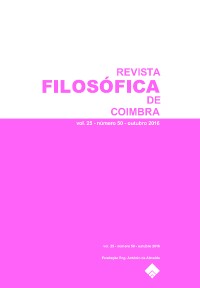Please use this identifier to cite or link to this item:
https://hdl.handle.net/10316.2/42851| Title: | Por mor de quê?: uma questão fundamental na analítica existencial de Heidegger | Other Titles: | For what’s sake?: a fundamental question in Heidegger’s existential analytic | Authors: | Lima, Paulo Alexandre | Keywords: | Finality;for the sake of oneself;Heidegger;interrogative category;ipseity;philosophy;Catégorie interrogative;en vue de soi-même;finalité;Heidegger;ipséité;philosophie;Categoria interrogativa;filosofia;finalidade;Heidegger;ipseidade;por mor de si | Issue Date: | 2016 | Publisher: | Imprensa da Universidade de Coimbra | Abstract: | Considera-se, a partir da analítica existencial de Heidegger, o por mor de si como categoria interrogativa. Antes do mais, mostra-se que a pergunta “por mor de quê?” corresponde a uma das desformalizações possíveis da pergunta “que é a filosofia?” – enquanto esta pergunta procura alcançar uma definição da situação em que se está. Em seguida, demonstra-se como o por mor de si se acha presente nas categorias fundamentais da situação (a totalidade do si-mesmo e a totalidade dos restantes entes que aparecem ao si-mesmo) e as determina enquanto categorias interrogativas de finalidade. Por via da análise de três fenómenos (a consciência da morte, a angústia e o tédio), indicam-se algumas das formas possíveis de a situação formular explicitamente a pergunta pela sua própria finalidade – a pergunta que consiste numa das concretizações possíveis daqueloutra pergunta: “que é a filosofia?”. Dans cet article, nous allons considérer, à partir de l’analytique existentiale de Heidegger, la catégorie de l’“en vue de soi-même” comme catégorie interrogative. Tout d’abord, nous chercherons de montrer que la question: “en vue de quoi?” correspond à une des concrétisations possibles de la question: “qu’est-ce que la philosophie?” – entant que cette question vise à parvenir à une définition de nôtre situation. Ensuite, nous essayerons de démontrer comment l’“en vue de soi-même” est présent dans les catégories fondamentales de nôtre situation (c’est-à-dire la totalité du soi-même et la totalité de tout ce qui apparaît au soi-même) et les détermine comme des catégories interrogatives de finalité. Par le moyen de l’analyse de trois phénomènes (notamment la prise de conscience de la mort, l’angoisse et l’ennui), nous allons indiquer quelques-unes des formes possibles dans lesquelles nôtre situation pose explicitement la question de leur propre finalité – en tant qu’une des réalisations possibles de cette autre question: “qu’est-ce que la philosophie?”. We will consider the category of for the sake of oneself in Heidegger’s existential analytic as an interrogative category. First of all, we will show how the question “for the sake of what?” corresponds to one of the possible deformalizations of the question “what is philosophy?” – insofar as this question tries to reach a definition of the human situation. Next, we will point out how the category of for the sake of oneself is constitutive of the fundamental categories of the human situation (such as the totality of the self and the totality of other beings that appear to the self) and plays a major role in the determination of those categories as interrogative categories of finality. Through an analysis of three phenomena (such as the consciousness of death, anxiety and boredom) we will indicate some of the possible ways in which the human situation can explicitly ask the question of its own finality – a question that consists in one of the possible concretizations of that other question: “what is philosophy?”. |
URI: | https://hdl.handle.net/10316.2/42851 | ISSN: | 0872-0851 | DOI: | 10.14195/0872-0851_50_6 | Rights: | open access |
| Appears in Collections: | Revista Filosófica de Coimbra |
Files in This Item:
| File | Description | Size | Format | |
|---|---|---|---|---|
| por_mor_de_que.pdf | 928.49 kB | Adobe PDF |  |
Items in DSpace are protected by copyright, with all rights reserved, unless otherwise indicated.
